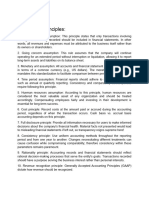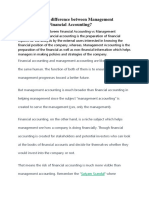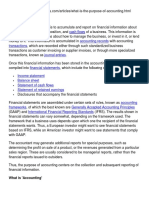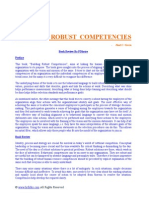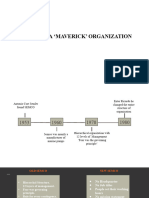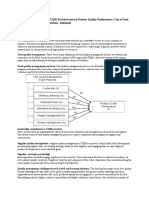Basic Accounting Principles
1. Introduction to Accounting Principles
Accounting principles are fundamental rules and guidelines that govern the practice of
accounting. They ensure consistency, reliability, and comparability of financial statements across
different entities. These principles are crucial for accurate financial reporting and are used to
prepare financial statements that reflect a company's economic activities.
2. Generally Accepted Accounting Principles (GAAP)
GAAP is a set of accounting standards and procedures used primarily in the United States. These
principles are established by the Financial Accounting Standards Board (FASB) and are designed
to provide transparency and uniformity in financial reporting. Key components include:
Revenue Recognition Principle: Revenue should be recognized when it is earned and
realizable, regardless of when cash is received. This means that revenue is recorded when
the goods or services are delivered, not when payment is made.
Matching Principle: Expenses should be matched with the revenues they help generate.
This ensures that expenses are recorded in the same period as the related revenues,
providing a more accurate picture of profitability.
Historical Cost Principle: Assets should be recorded at their original purchase cost
rather than their current market value. This principle provides reliability but can be less
relevant over time due to inflation or market fluctuations.
Full Disclosure Principle: All relevant financial information must be disclosed in the
financial statements to provide users with a complete view of the company's financial
status. This includes detailed notes and explanations.
Consistency Principle: Companies should use the same accounting methods and
procedures from one period to the next unless a change is warranted and disclosed. This
consistency allows for comparability over time.
3. International Financial Reporting Standards (IFRS)
IFRS are international accounting standards issued by the International Accounting Standards
Board (IASB). They aim to bring consistency and transparency to financial reporting across
different countries. Key differences from GAAP include:
Fair Value Measurement: IFRS often requires assets and liabilities to be measured at
fair value rather than historical cost. This can provide more relevant and timely
information.
Revenue Recognition: IFRS has a principles-based approach to revenue recognition,
focusing on the transfer of control rather than the completion of performance obligations.
Leases: Under IFRS 16, lessees are required to recognize most leases on their balance
sheets, reflecting both the right-of-use asset and lease liability.
4. Accounting Assumptions
�Certain assumptions underpin the application of accounting principles:
Economic Entity Assumption: Business transactions are separate from the personal
transactions of its owners or other businesses. This ensures that financial statements
reflect only the activities of the business entity.
Going Concern Assumption: The assumption that a business will continue to operate
indefinitely, unless there is evidence to the contrary. This affects the valuation of assets
and liabilities.
Monetary Unit Assumption: All financial transactions are recorded in a consistent
monetary unit (e.g., dollars) and are assumed to be stable over time. This simplifies the
recording and reporting process.
Time Period Assumption: Financial activities are divided into distinct periods (e.g.,
months, quarters, years) for reporting purposes. This helps in assessing performance and
making comparisons over time.
5. Importance and Impact of Accounting Principles
Adhering to accounting principles is vital for several reasons:
Consistency: They ensure that financial statements are prepared consistently, making it
easier for stakeholders to compare financial performance over time and across different
companies.
Transparency: Principles like full disclosure provide stakeholders with a clear and
complete picture of a company's financial health, aiding in better decision-making.
Trust: By following established principles, companies build trust with investors,
creditors, and regulators, which is essential for maintaining a positive reputation and
securing financing.
Compliance: Adhering to accounting principles helps ensure compliance with regulatory
requirements, reducing the risk of legal issues and penalties.



























